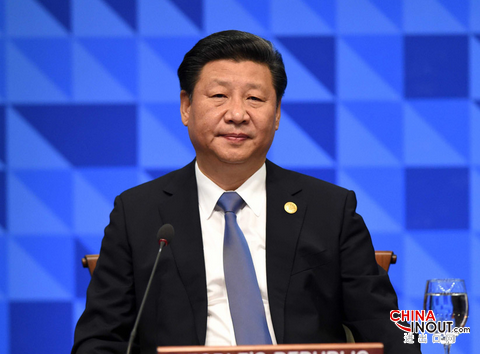國家主席習近平在周三表示,,中國將大幅減弱對外國投資的限制,,同時他號召建立亞太自貿(mào)區(qū)(FTAAP)。
“我們將加強外國投資者管理制度改革,,大幅降低外資進入市場的準入門檻,,提高對知識產(chǎn)權(quán)的保護,加快建立開放,,透明,,公平,高效的市場環(huán)境,。”習近平在在馬尼拉的亞太經(jīng)濟合作組織領(lǐng)導人會議講到,。
習近平表示,亞太經(jīng)濟體必須“公平參與,、充分協(xié)調(diào)”自由貿(mào)易安排,,以促進區(qū)域經(jīng)濟一體化,,提高區(qū)域的開放性和包容性,。
新的自由貿(mào)易安排不斷浮出水面,習近平說,,但在加快推進去年北京APPEC會議提出的FTAAP建設(shè)時,,他們已經(jīng)造成了分散區(qū)域經(jīng)濟的可能,。
據(jù)新華社發(fā)表的演講稿,習近平表示,,中國是亞太地區(qū)的一部分,,并將通過“一帶一路”項目和亞投行(AIIB)繼續(xù)奉行開放包容的地區(qū)合作。
專家認為,,習近平的評論針對美國領(lǐng)導的跨太平洋伙伴關(guān)系協(xié)議,這項協(xié)議將中國這一世界第二大經(jīng)濟體排除在外,。
中國國際經(jīng)濟交流中心經(jīng)濟研究部主任徐洪才表示,,“TPP在一定程度上是相對排外的,中國需要更加開放包容的亞洲市場,。”
習近平還說,,與會的各國領(lǐng)導人一致認為,盡管全球經(jīng)濟正在“穩(wěn)定”復蘇,,但仍缺乏“堅實的”基礎(chǔ)并繼續(xù)面臨挑戰(zhàn),,亞太地區(qū)國家必須率先推動經(jīng)濟增長。
習近平說,,“面對動蕩的現(xiàn)狀,,所有亞太經(jīng)濟體必須肩負起這一重任,,團結(jié)起來,努力推動全球經(jīng)濟向前發(fā)展,。”
中國社會科學院世界經(jīng)濟與政治研究所所長黃煒說,,由于許多國家在經(jīng)濟發(fā)展方面沒有達到高收入的地位,經(jīng)濟發(fā)展仍然應(yīng)該是亞太經(jīng)合組織會議的首要目標之一,。
“對亞太經(jīng)合組織來說,,相比于陷入政治,專注于經(jīng)濟可能是一個更好的選擇,,”黃煒說,。(中國進出口網(wǎng))
President Xi Jinping on Wednesday said China will significantly reduce restrictions on foreign investment and called for the establishment of a Free Trade Area of the Asia-Pacific (FTAAP).
"We will step up reforms in the foreign investors management system, substantially cut restrictions on market access for foreign investment, improve intellectual property protection, and foster an open, transparent, fair and highly efficient market environment," Xi told the Asia-Pacific Economic Cooperation (APEC) CEO meeting in Manila.
Xi said Asia-Pacific economies must "participate fairly in and fully coordinate" free trade arrangements to boost the integration of regional economies and improve openness and inclusiveness in the region.

New free trade arrangements continue to surface, but they have caused concerns over the potential of fragmenting regional economies, Xi said, while seeking to accelerate the establishment of the FTAAP, an initiative proposed at the APEC meeting in Beijing last year.
Xi said China is part of the Asia-Pacific region, and will continue to pursue open and inclusive regional cooperation through initiatives such as the "Belt and Road" and the Asia Infrastructure Investment Bank (AIIB), according to a transcript of his speech published by the Xinhua News Agency.
Experts said Xi's comments on the FTAAP are aimed at the US-led Trans-Pacific Partnership (TPP), of which the world's second-largest economy has been excluded.
"The TPP is relatively exclusive so far and China wants a more open and inclusive Asian market," said Xu Hongcai, director of the Economic Research Department under the China International Economic Exchanges.
Xi also said world leaders at the summit agree that while the global economy enjoys a "stable" recovery, it still lacks a "solid" foundation and continues to face challenges, and Asia-Pacific countries must take the lead to boost economic growth.
"Facing turbulent currents … all economies in the Asia-Pacific region must take on the task, pull together and strive to push the global economy forward," Xi said.
Since many countries in the region haven't achieved a high-income status, focusing on economic development should still be the priority of APEC meetings, said Huang Wei, a director of the Institute of World Economics and Politics of the Chinese Academy of Social Sciences.
"For APEC, instead of getting bogged down by politics, focusing on economics may be a better option," said Huang.











